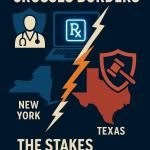What do pregnant women with high fevers and people with severe chronic pain have in common? Increasingly, both are being told to “tough it out.”
Policy & Ethics
Critical Medicines Are a Matter of National Security
While federal agencies have yet to issue a definition of ultra-processed foods (UPFs), California has moved ahead.
“By September, we will know what has caused the autism epidemic, and we'll be able to eliminate those exposures." - Rober
It's almost impossible to go for a week without the rare earth elements popping up in the news. A few recent examples:
Join Cameron English and Dr. Chuck Dinerstein on Episode 134 of the Science Dispatch podcast as they tackle the science of "gender-affirming care."
Sometimes an idea is so absurd it can only come out of a university. Here’s a recent example: in order to halt climate change, we should genetically engineer ticks to spread a disease that renders people allergic to red meat.
One point of agreement I have with the MAHA movement is a disdain for those direct-to-consumer (DTC) pharmaceutical ads that plague my media feed. Although, while not as incensed as Secretary Kennedy,
Given the rising political temperature in the country, there is an unsurprising rise in online hate speech.
“The state of New York, acting through the Ulster County Clerk, should not be permitted to escape the constitutional obligation under the Full Faith and Credit Clause.”












